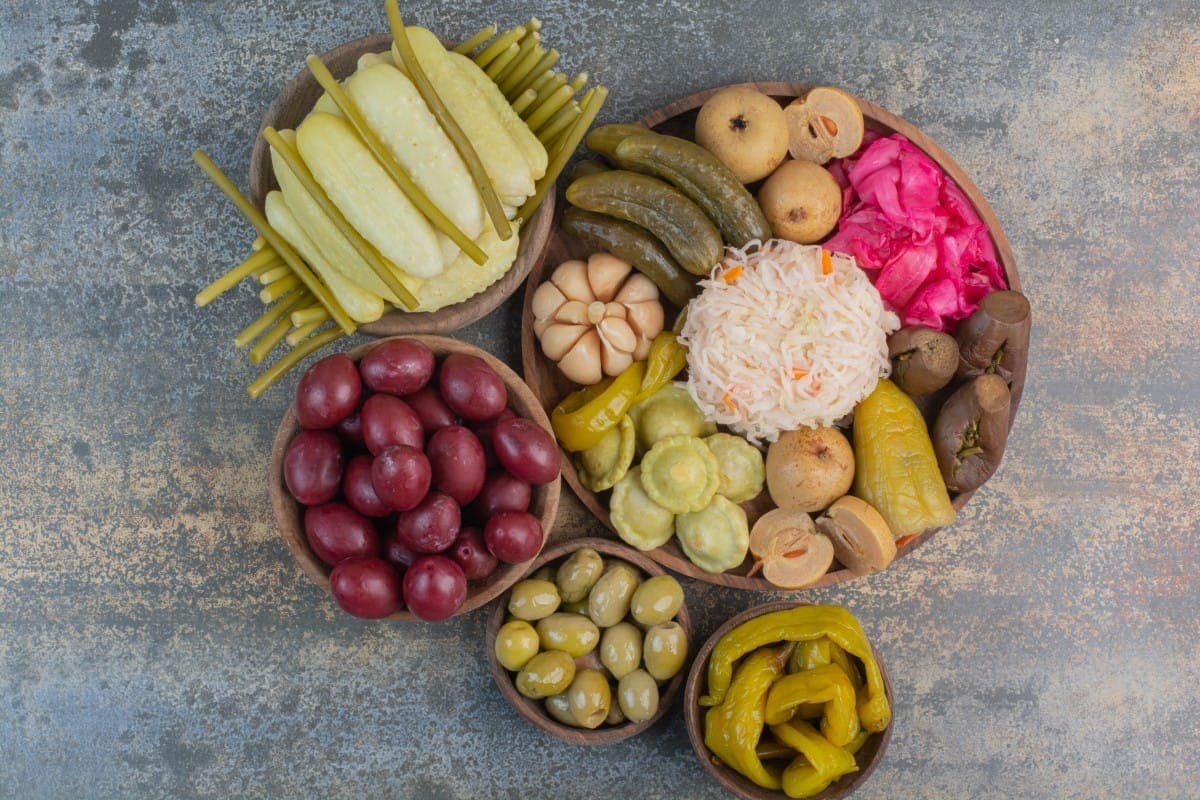If you click on links we provide, we may receive compensation.
Pickled foods have been part of human diets for centuries, celebrated for their flavor and extended shelf life. In recent years, there has been growing interest in whether these tangy treats offer any health benefits. Some enthusiasts tout pickled foods as a boon for gut health, while others suggest they might be beneficial in other ways. But what does the evidence say about the health benefits of pickled foods? This article explores the scientific research and expert opinions on the matter.
Pickled Foods and Gut Health
One of the most cited benefits of pickled foods is their potential to enhance gut health. Many pickled products, especially those that are naturally fermented, contain probiotics. Probiotics are live bacteria and yeasts that are good for your digestive system. They are like the beneficial microorganisms found in the human gut and can help maintain a healthy balance of gut flora.
A study published in the journal Nutrients found that fermented foods, including certain types of pickles, can introduce beneficial bacteria into the gut. This can help improve digestion and boost the immune system. For example, kimchi, a traditional Korean pickled dish made from fermented vegetables, has been shown to contain Lactobacillus bacteria, which can aid in digestion and enhance immune function.
Nutritional Value of Pickled Foods
Pickled foods are often vegetables, and vegetables are known to be rich in vitamins and minerals. When vegetables are pickled, they generally retain most of their nutritional value. Pickling can also enhance certain nutrients. For instance, the fermentation process can increase the availability of B vitamins, which are essential for energy production and overall health.
However, it’s important to note that pickled foods can also be high in sodium. The pickling process typically involves a brine solution made with salt, which can lead to high sodium content. According to the Centers for Disease Control and Prevention (CDC), high sodium intake is linked to increased blood pressure, which can raise the risk of heart disease and stroke. Therefore, while pickled foods can be nutritious, they should be consumed in moderation, especially by individuals with hypertension or those at risk for cardiovascular diseases.
Antioxidant Properties
Some pickled foods, particularly those made from brightly colored vegetables, contain antioxidants. Antioxidants are compounds that help protect the body from oxidative stress and free radical damage. Free radicals are unstable molecules that can cause cellular damage, contributing to aging and various diseases, including cancer.
For example, pickled beets are a good source of antioxidants, including betalains, which give beets their vibrant color and have been shown to have anti-inflammatory and antioxidant properties. A study published in the Journal of Food Science found that the antioxidant levels in pickled vegetables remained relatively stable during the pickling process, suggesting that these foods can still contribute to overall antioxidant intake.

Potential Drawbacks
Despite the potential health benefits, there are some drawbacks to consuming pickled foods. As mentioned earlier, the high sodium content is a significant concern. In addition to increasing blood pressure, high sodium intake can lead to fluid retention and other health issues. The American Heart Association recommends that adults limit their sodium intake to no more than 2,300 milligrams per day, with an ideal limit of 1,500 milligrams per day for most adults, especially those with hypertension.
Moreover, not all pickled foods are created equal. Commercially pickled products often contain preservatives, artificial colorings, and added sugars, which can diminish their health benefits. It is crucial to read labels and choose products with minimal additives or consider making pickled foods at home, where you can control the ingredients.
Fermented vs. Vinegar-Pickled Foods
There is a distinction between fermented pickled foods and those pickled with vinegar. Fermented foods undergo a natural process where bacteria convert sugars into lactic acid, which acts as a preservative. This process not only preserves the food but also creates probiotics. Examples of naturally fermented foods include sauerkraut, kimchi, and certain types of pickles.
On the other hand, vinegar-pickled foods are preserved using vinegar, which is acidic and prevents the growth of harmful bacteria. While these foods are still flavorful and retain some nutritional benefits, they do not offer the probiotic advantages of fermented pickles. Therefore, if gut health and probiotics are your primary concerns, fermented pickled foods might be a better choice.
Cultural Significance and Traditional Diets
Pickled foods are an integral part of many traditional diets around the world. In Japan, pickled plums, known as umeboshi, are a common side dish believed to aid digestion and detoxify the body. In Eastern Europe, pickled cucumbers are a staple, often consumed with meals to add a burst of flavor and crunch. These traditional practices reflect the long-standing belief in the health benefits of pickled foods.
Research has shown that traditional diets, which often include fermented and pickled foods, can have health benefits. The Mediterranean diet, for example, is rich in vegetables, fruits, nuts, and fermented foods like yogurt and olives. This diet has been associated with a lower risk of chronic diseases, including heart disease and diabetes. Similarly, the traditional Korean diet, which includes kimchi, has been linked to lower rates of obesity and metabolic syndrome.
Balancing Benefits and Risks
In summary, there is evidence to suggest that pickled foods can be part of a healthy diet, particularly when they are naturally fermented and consumed in moderation. They offer potential benefits for gut health, provide valuable nutrients, and can contribute to antioxidant intake. However, the high sodium content and the presence of additives in commercially pickled products are significant drawbacks.
For those interested in reaping the health benefits of pickled foods, choosing naturally fermented options or making pickled foods at home can be a good approach. By doing so, you can control the ingredients and minimize the intake of sodium and additives. As with any food, moderation is key, and pickled foods should be part of a balanced diet rich in a variety of fresh, whole foods.




